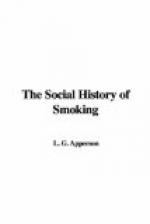A few years earlier, in November 1825, Scott had written in his “Journal” that after dinner he usually smoked a couple of cigars which operated as a sedative—
Just to drive the cold
winter away,
And drown the fatigues of
the day.
“I smoked a good deal,” he continued, “about twenty years ago when at Ashestiel; but, coming down one morning to the parlour, I found, as the room was small and confined, that the smell was unpleasant, and laid aside the use of the Nicotian weed for many years; but was again led to use it by the example of my son, a hussar officer, and my son-in-law, an Oxford student. I could lay it aside to-morrow; I laugh at the dominion of custom in this and many things.
“We make the giants first, and then do not kill them.”
Scott’s remark that Lockhart smoked when an Oxford student rather discredits Archdeacon’s Denison’s statement, quoted in the preceding chapter, that smoking was very generally unknown in Oxford in 1823-24. The archdeacon was writing from memory—a very untrustworthy recorder; Scott’s remark was that of a contemporary.
Byron is reputed to have been another cigar-smoker. His apostrophe to tobacco in “The Island” (1823), a poem founded in part on the history of the Mutiny of the Bounty, is familiar. The lines are, indeed, almost the only familiar passage in that poem:
Sublime tobocco! which, from east to west, Cheers the tar’s labours or the Turkman’s rest; Which on the Moslem’s ottoman divides His hours, and rivals opium and his brides; Magnificent in Stamboul, but less grand, Though not less loved, in Wapping or the Strand: Divine in hookas, glorious in a pipe, When tipp’d with amber, mellow, rich, and ripe; Like other charmers, wooing the caress, More dazzlingly when daring in full dress; Yet thy true lovers more admire by far Thy naked beauties—Give me a cigar!
How far these lines really represent the poet’s own sentiments, and whether he habitually smoked either cigar or pipe, is another matter.
Other men of letters of the time were zealous adherents of the pipe. One of these was the poet Campbell. From 1820 to 1830 he was editor of the New Monthly Magazine, and is reputed to have been so very unbusinesslike in his methods that there was always difficulty in getting proofs corrected and returned in good time. On one occasion, as reported by a member of the firm that printed the magazine, a proof had been lost, and the poet was informed that the article must go to press next day uncorrected. Campbell sent word that he would look in in the morning and correct it. Preparations were duly made to receive him; he was shown into the best room, and left with the proof on his table. After a while he rang the bell, and said, “I could do this much better if I had a pipe.” Thereupon pipe and tobacco were procured and taken in to him. Campbell tore open the paper containing the tobacco, and, with a slightly contemptuous expression, exclaimed, “Ugh! C’naster! I’d rather it had been shag!”




